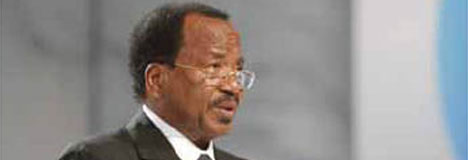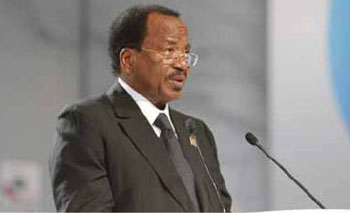The Cameroonian Head of State, Paul Biya, running for re-election in the 9 October presidential elections, said at the third congress of the ruling party, RDPC, held on 15 September, that Cameroon would soon enter into a faster development phase; the policy of « great ambitions » that has been in force so far is to be replaced by that of «major accomplishments ».

The Cameroonian Head of State, Paul Biya, running for re-election in the 9 October presidential elections, said at the third congress of the ruling party, RDPC, held on 15 September, that Cameroon would soon enter into a faster development phase; the policy of « great ambitions » that has been in force so far is to be replaced by that of «major accomplishments ».

Paul Biya, 78, who spent 29 years in office as President, is manifestly determined to satisfy a personal wish: that of entering into history as « the one who brought progress and development to Cameroon ».
« With effect from January 2012, Cameroon will be transformed into an immense construction site ». This declaration was made by the Cameroonian Head of State, when he presided over the third ordinary congress of the ruling party, the Cameroonian Peoples' Democratic Movement (RDPC) held in Yaounde on 15 and 16 September 2011. He is and continues to be the national president of his party. This declaration, which sounds more like a commitment is an indication of what Cameroon should be during the next few years. With a growth rate of 4% in 2011 and rather encouraging prospects in the medium-term, the implementation of developmental projects should help improve the competitiveness of the national economy, with the aim of achieving a double-digit growth during the current decade.
« With effect from January 2012, Cameroon will be transformed into an immense construction site » the Cameroonian Head of State announced as he presided over the third ordinary congress of the RDPC, held in Yaounde on 15 and 16 September 2011.
After seven years of « great ambitions » inaugurated in 2004 when the current Head of State was vying for the votes of his compatriots, Paul Biya believes that the time has come to move to the higher level, which should be focused on the effective achievement of major works, to enable Cameroon to become « an emerging economy by 2035 ».
From « great ambitions » to « major accomplishments»
For the Cameroonian President, the policy of « great ambitions », whose goal was to « give a boost to our economy» and the first phase of which was the stabilization of public finance which had been in difficulty because of the effects of the crisis and structural adjustment constraints, henceforth enables us to envision the future with optimism, as illustrated by the encouraging effects of the new strategy for growth and employment instituted recently. « The implementation of this economic programme requires that efforts be focused on the acceleration of growth, backed by good governance and an optimal strategic management of public affairs », he insisted. There are also plans to « pursue efforts to strengthen the rule of law with a view to ensuring the security of persons and goods, improving the business climate and allowing the citizens access to information ». Campaign speech? Maybe, when we know that the outgoing President is running for re-election in the October presidential elections.
In the field of transportation, these projects concern the construction of road structures, such as the second bridge over Wouri, port structures with the deep-water port of Kribi and that of Limbé, as well as railway structures meant to support the implementation of major projects with high growth potential. The resumption of the activities by a national air transport company is also among the planned activities with the launching of Camair Co ».
Cameroon is an agricultural country par excellence but its agro-pastoral potentials are underexploited. It is thus compelled to import close to 500 billion francs CFA of agri-food products every year. This situation contributed to the country's balance of payment deficit. The Head of State announced major projects in this sector, as well as the creation of an agricultural bank, the Cameroon Rural Finance Corporation (CARFIC), which marks the government's determination to provide this vital sector of the economy with the tools required for its growth.
A competitive economy
In the short and medium terms, notably in the next ten years, Cameroon intends to step up its growth to an average of 5.5% per annum. There are plans to reduce under-employment from 76% to less than 50% and cut the poverty rate by about 25% in 2020.
In addition to the projects listed, Cameroon plans to raise the installed energy production capacity to 3000 MW against the current 933 MW, step up the share of the building and works sector in good condition from 12% to 55% by asphalting more than 35 000 km of earth roads, rehabilitating 1000 km of railroads raising the mobile teledensity to 65% by 2020.
These projects require more than 800 000 tons of cement per annum. It is worth noting that national production is currently about 1 600 000 tons of cement per annum. These construction sites and many others will result in the creation of over 300 000 direct and indirect jobs, and will contribute to boosting public funds.
The political environment
Strengthening the competitiveness of the Cameroonian economy also requires the further modernisation of the political environment. The establishment of "Elections Cameroon" (ELECAM), « the independent body entrusted with organizing and supervising the elections in Cameroon » and the enhanced involvement of political parties and the civil society in the management of the electoral process fit into these efforts. Paul Biya further revealed that « Cameroon has a legal framework for the expression of fundamental freedoms»: political freedom, freedom of association, freedom of religion, freedom of opinion, freedom of movement, freedom of the press and many more. « What we need today to ensure the development of Cameroon, is of course, enterprising men and women, with solid cultural and technical background, but also courageous men and women with strong ethics, solid moral and spiritual education, entrenched in the ideals of integrity and justice, respectful of public property »,he added.
National Education
For the rest, the Cameroonian President pointed out that national education is still at the centre of priorities. It is a sector that uses up the quarter of the country's budget, with more than 600 billion CFA francs for 2011. In the health sector, the construction and equipment of hospitals and social housing units is still a key concern, as attested by the ongoing construction of 10 000 social housing units in several Cameroonian cities.
ACHILLE MBOG PIBASSO, DOUALA
However, Paul Biya, 78, who spent 29 years as head of State, is manifestly determined to satisfy a personal wish, that of entering into history as « the one who brought progress and development to Cameroon »